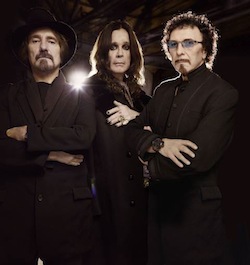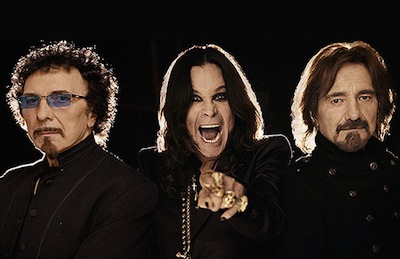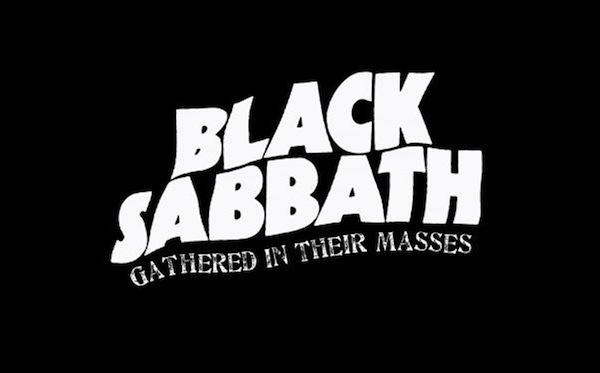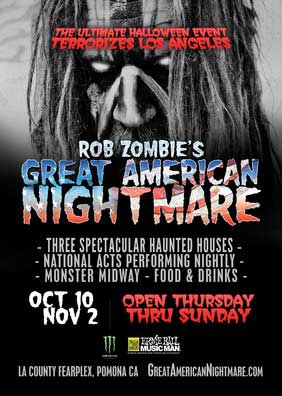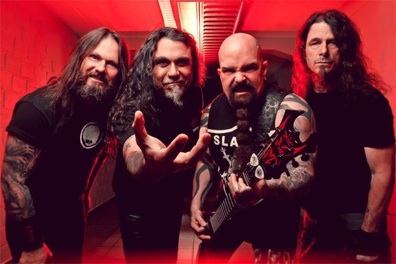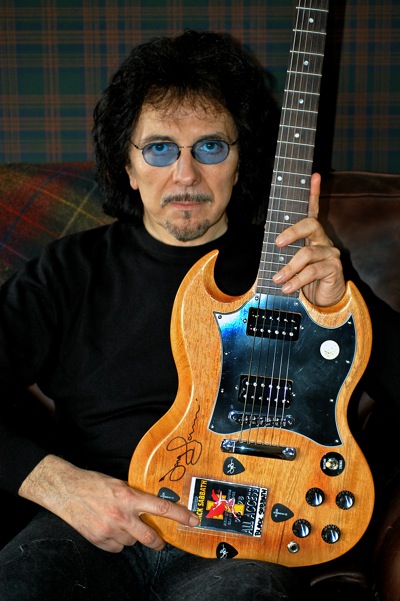SINGER GRAHAM BONNET DISCUSSES ALCATRAZZ, RAINBOW AND MICHAEL SCHENKER
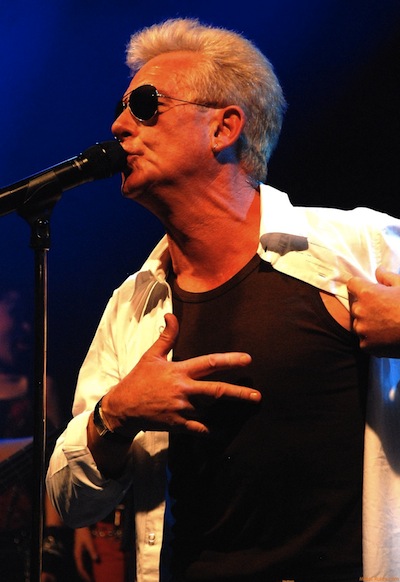 Greg Prato of Songfacts spoke with singer Graham Bonnet (Alcatrazz, Rainbow, Michael Schenker Group) about the many bands and musicians he has played with over the years. Portions of the interview appear below.
Greg Prato of Songfacts spoke with singer Graham Bonnet (Alcatrazz, Rainbow, Michael Schenker Group) about the many bands and musicians he has played with over the years. Portions of the interview appear below.
Songfacts: How would you compare playing in the current Alcatrazz lineup to the ’80s version of Alcatrazz?
Graham: Well, it’s completely different. We have no keyboard player, so it’s a smaller band of musicians. What we’ve done – a secret – is we’ve prerecorded keyboards. We play to a click track when we go on stage, because a lot of the music I made in the past has been very heavily keyboard oriented. So we’ve had to do that, unfortunately. Our keyboard player actually left – he went to get a real job, like big men do. He decided the music business wasn’t for him anymore. He was our keyboard player and second guitar player. His name’s John Thomas, and he’s a really great guitar player and worked very well with our current guitar player, Howie Simon.
He left, so it’s completely different. I often think about the original band, the first band we put together with Yngwie Malmsteen playing and then the second band with Steve Vai, and it was a completely different world then. It was very exciting, it was all new, and everybody’s going, “Who are these guitar players?” But now there are so many guitar players that have that same kind of style, as well as singers who sing high, it’s becoming done to death.
But I do miss that feeling of the first band. The first lineup we had was great, with Yngwie playing, and the second with Steve. Then the third one was with Danny Johnson who eventually went to play with Steppenwolf. Danny’s a very bluesy player, so he found it hard to fit. He said: “I can’t play all this heavy whittley whittley stuff.” But he did. And he could. But a better job come along, so he went with Steppenwolf for about 13 years after he left Alcatrazz.
But the first lineup was a great lineup with Yngwie, because it was all new and fresh with this new guitar player, this young kid who everybody loved to death. I kind of miss that. It’d be nice to do it again, but I don’t think that will happen. I don’t think there’ll be a reunion.
Songfacts: It’s funny you said that – I don’t know if I’m in the minority, but I actually prefer the Steve Vai lineup. I think the Disturbing the Peace album is an underrated ’80s rock classic.
Graham: I like the second album best, myself. The first one was kind of a tester, because my idea was to put a band together that was kind of like Rainbow, basically. Rainbow Part II: keyboard player, guitar player who played like Ritchie [Blackmore]. Yngwie had been a big fan of Ritchie and people like Uli Roth, so he fit the bill perfectly. And when Steve came along, for me it was more interesting, because it didn’t take the same kind of roads as so-called heavy rock would normally take, because he was from Frank Zappa and he had a different approach to music. He was very, very different, and I found it good fun to write tunes with him, because of the way he directed his arrangements guitar wise. And it gave me more space to write better melodies and think about better lyrics, as well. So I prefer the second album. That’s my favorite album of all.
Songfacts: How did you originally cross paths with Ritchie Blackmore?
Graham: That was through Roger Glover. One of my friends, Mickey Moody, was playing for Whitesnake at that time, and I think Roger was producing their album. This is 1970-something. Mickey told Roger that I was doing some solo stuff, which was successful in places like Australia and New Zealand. Weird places – everywhere but England. Roger wanted to know what I was doing, so they invited me over to this chateau on the border of Switzerland and France, and they gave me a song to learn. I had to learn a song called Mistreated, which I didn’t know anything about. I didn’t know anything about Rainbow at all, to be honest with you. So I had to buy the albums and learn one song as an audition.
Roger phoned me up and said, “Will you come over and do a song with us?” And so I went over there and sang at them and they gave me the job. That was it, really. Then I went home, thought about it, and I said to my manger, “I’m not right for this. I’m not like these other guys, long hair and all the rest of it. I don’t fit.” But I did in the end.
Songfacts: Would you say that played a part in your not staying very long in the band, that you felt like you didn’t really fit with that band?
Graham: Yeah. It came to a somewhat slow end. Because Cozy Powell [drummer] left the band before we started rehearsing for the second album in Copenhagen, and rehearsals were with Bobby Rondinelli, the new drummer who came in. Cozy was a very close friend of me and Don Airey, you know. We’re very close, and when he left, Don was threatening to leave. Ritchie didn’t sometimes turn up to rehearsals, so it would be me and Don and Bobby Rondinelli there, and sometimes not even Roger Glover.
They’d look at each other, “Well, what are we doing?” “We’re rehearsing for the next album.” “Oh, okay.” And we only had one song, just a song that Russ Ballard wrote, called I Surrender. That’s the only song we had. So we’re sitting around looking at each other and Ritchie would come in for like half an hour and plonk on his bass pedals or whatever the hell, and then he would go. It was unproductive. The thrill had gone, so to speak.
Bobby Rondinelli really wanted to fix it and get on with it, but we just didn’t gel and nothing was happening, so I went home. I went back to LA and the management called me and said, “What do you want to do?” I said, “Well, nothing’s happening.” I’d put down some backing vocals to the song I Surrender, that’s all I’d done on this album, because it was not going anywhere. So he said, “Do you want to sing the songs you like and have another singer sing the songs you don’t like?” I said, “Well, there’s no songs there. And two singers – no, that won’t work for me.”
So I left the band. That was it.
Songfacts: I understand. And then how did you cross paths with Michael Schenker and also sing on the MSG album, Assault Attack?
Graham: Cozy was in the band at the time, and he invited me down to I think it was The Country Club in LA. I went down and I saw the band play. I didn’t know what was going to happen that night, but Cozy came up to me and said, “What do you think about the band?” I said, “Oh, it’s great. Fantastic songs.” I’d never met Michael before or any of the guys.
He said, “Oh, you like the band, do you? Do you want to be in it?” I said, “What do you mean do I want to be in it?” I said, “You have a singer.” He said, “Well, yeah, he’s probably going.” So that’s how that started. Gary Barden left the band or whatever happened there, I don’t know the whole story. I don’t know whether he was fired or he just left.
So then I went back home and a few weeks later I got some tapes from Michael signed “Urgent.” There were three tunes on there that he wanted me to write words and melodies to, so that’s what I did. And the next thing I know I was over in London doing rehearsals with the band for an album. I was suddenly in the band. It was out of the blue, really.
Songfacts: How was it writing then, with Michael Schenker?
Graham: Well, he basically gave me the tracks and I went home… well, I wasn’t at home. In fact, Roger Glover’s house, of all places. I was staying there. I wrote most of the words there at Roger’s house, sitting outside and drinking wine to get some inspiration, because I’d never actually written a whole album before.
It was quite a challenge, because Michael doesn’t speak English too well. He couldn’t write lyrics to his songs very well, and he gave me the job. He said, “Can you please write these, Graham, I can’t do this, you know.” So I ended up writing the melodies and everything. For me it was very weird to write words and melodies to songs that had an arrangement all there, and he had to fit in the lyrics and the melody. When I used to make up my own tunes before Rainbow, I’d write on an acoustic guitar and I knew where every part was going to come. But when a guitar player writes a piece, it’s, “OK, where does the melody go? Where do I sing? Do I stop here, do I start here?” So it was a bit of a challenge. But Michael just said, “Do what you think. Come in wherever you want to come in. And then afterwards when we record properly, I will arrange my guitar parts around your vocal.”
So it was a good challenge and Michael gave me a great job. And eventually it led to better things.
Songfacts: With Alcatrazz, how did the songwriting work?
Graham: Well, it was mainly me and Yngwie, the first version of Alcatrazz. I had ideas and I would play them to Yngwie and then he would embellish with his fantastic guitar playing. I’d say, “Okay, you take it from here.” And it was usually me and him and sometimes the keyboard player, Jimmy Waldo. He would have ideas for an intro or a middle part to a tune, and that’s kind of how it went. But it was mainly the two of us, me and Yngwie. I wrote the melodies, but we’d work out the arrangements together.
Songfacts: Would you want to set the record straight once and for all regarding if Yngwie is hard to work with or not?
Graham: He wasn’t at first. [Laughs] But he became… he suddenly was engulfed by people telling him how wonderful he was. And when a kid is 19 years old and everybody’s telling you how marvelous you are and you could be better than this, how you could be the next Jimi Hendrix, it was very tempting for him, and his ego suddenly inflated. He became not a band member anymore – he wanted to go off on his own. And eventually, he did. It just wasn’t working. I could see it happening.
Songfacts: How would you compare songwriting with Yngwie to songwriting with Steve?
Graham: Well, with Steve it was more challenging, because he didn’t do the obvious arrangements. At first I thought, “Oh, God, we’re never going to get anything together.” Then after a couple of weeks, it became easier and he would know what I was thinking and I would know what he was thinking. We suddenly gelled really well.
So at first it was hard, but then it was good. It took a little while, but eventually he knew what I was thinking and I knew where he was going with something. And Steve thinks those tunes we wrote together on that album were some of his favorite tracks ever.
Songfacts: Were there ever plans to record another album with Steve, or did he already hook up with David Lee Roth once the touring was done for that album?
Graham: We didn’t start on anything. We were playing gigs and I didn’t even know he was leaving. The band did, but I didn’t. He said to the rest of the band, “Don’t tell Graham yet,” because we were still on the road, and he knew I’d be pissed off. And of course I was, I was very upset. “Oh, fuck.” This is really going a good way, and then David Lee Roth saw him and he was invited along. And of course money speaks. He would get paid a lot of money, and the ultimate hippie suddenly turned into Mr. Givemethemoney. Steve was very hippie-fied: “The money doesn’t bother me, it’s the art.” But then a better job comes along and, “See ya!”
Songfacts: Would you ever consider writing or recording again with Yngwie or Steve Vai if the opportunity came up?
Graham: Oh, yeah. Absolutely. Because no matter who they are now, they’re still great musicians. Abso-fucking-lutely. I don’t know if it will ever happen, because times have changed. People have gone their own way and everybody’s got their own careers going, and now guitar players are even more successful than any singers or drummers or bass players. Guitar players are always going to be gods to people.
Steve and Yngwie have their own careers going, so I don’t see where that’ll ever happen. But I would invite them in if they wanted to knock on the door.
Read more at Songfacts.
source: songfacts.com






